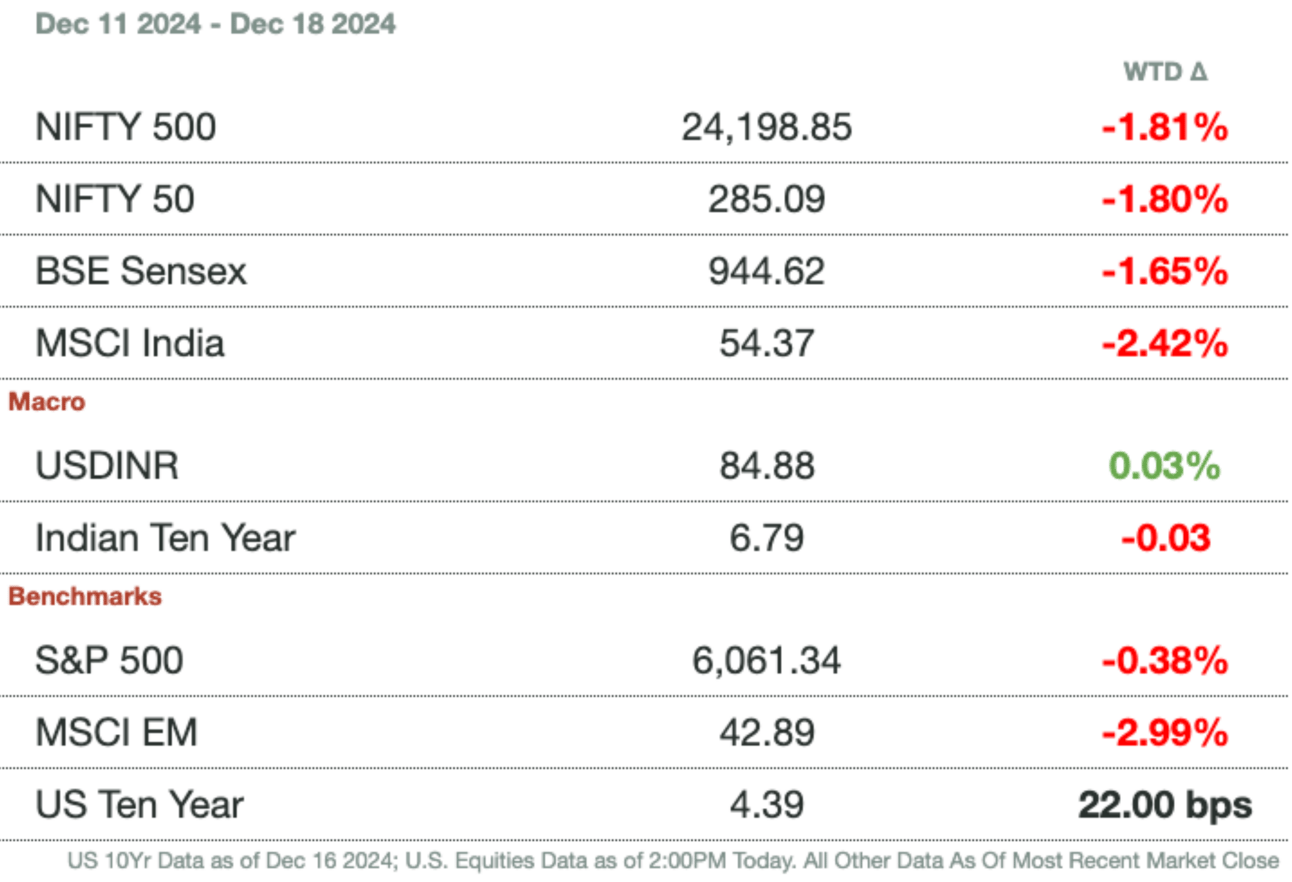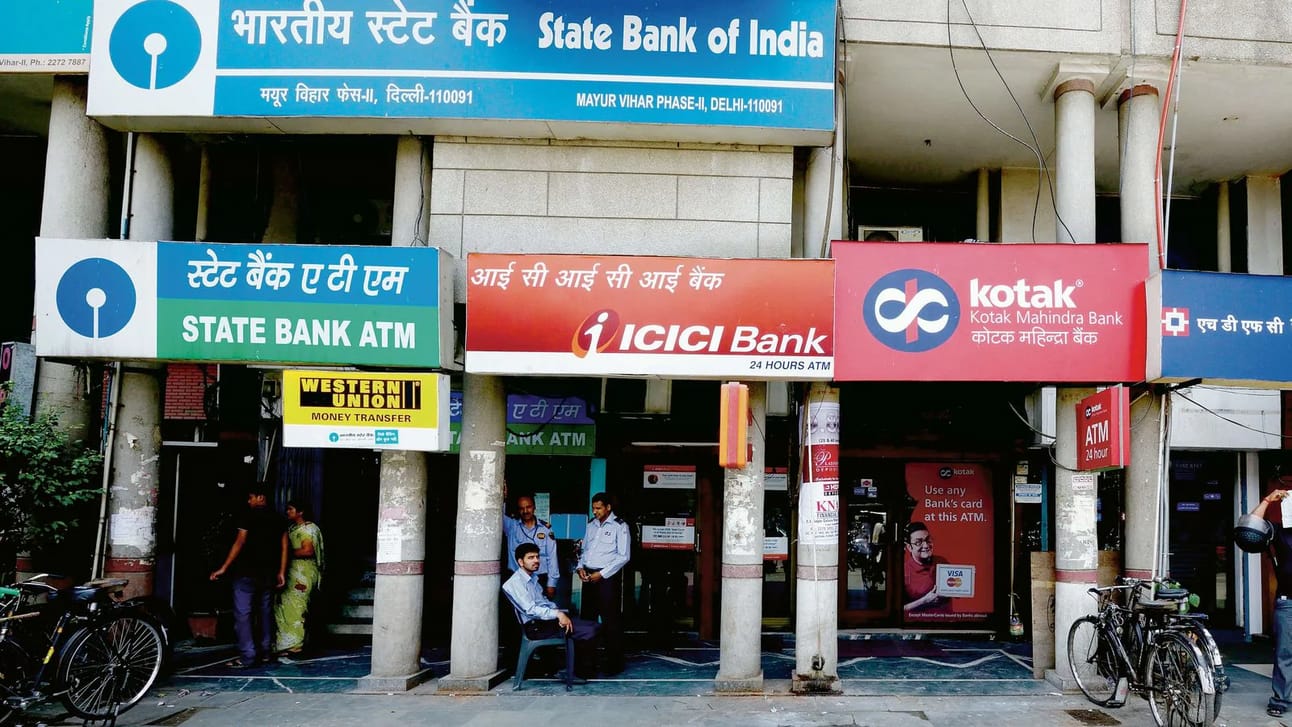
Welcome to Samosa Capital’s evening briefing — the best way to stay up-to-date on India’s financial markets. Here’s what’s in today’s newsletter:
India’s banks face a cash deficit,
Adani Group merges its cement subsidiaries,
And, Indian firms are raising billions from private markets.
Finally, we’ll close with Gupshup, a round-up of the most important headlines.
If you have feedback on our newsletter or just want to chat about India, always feel free to reach out to me. You can also share criticism about the newsletter anonymously here.
—Shreyas, [email protected]
Market Update

Live Event
Seats are running out for our upcoming “Future of India” expert panel and networking event on Wednesday, February 12, 2025, in New York City. Buy now here, or earn a free ticket by sharing Samosa Capital with three friends.
The Banks Are Not Alright
The banking system's cash deficit, indicated by bank borrowings from the RBI, has reached $17.7 billion (₹1.5 trillion) as of Monday, marking a six-month high. This deficit reflects the shortfall in capital that banks must borrow to meet the RBI's holding requirements. A growing deficit signals an increasing risk of a liquidity crunch or bank run, as banks may lack sufficient funds to manage a potential crisis.

In short: The risk of a bank run or liquidity crunch is at a six-month high, at a time when corporate earnings and Indian economic growth are slowing.
TBT: In July, LiveMint reported that the Indian banking system’s credit-deposit ratio was the highest in 20 years, aka the worst deposit crunch in decades.
Why now: Companies begin making advance tax payments, which reduces the cash they hold in banks. This effect is particularly pronounced in regional rural banks, which have seen significant cash outflows due to increased lending to farmers and local businesses. Additionally, since October, the RBI has been selling dollars to stabilize the rupee and keep its value below 85 per dollar. However, in the process, the RBI must purchase rupees and stockpile them, effectively removing liquidity from the banking system.
Cementing the Cement Business
Adani Group is merging its cement subsidiaries to streamline operations. The conglomerate owns Ambuja Cements, which Adani Group acquired in 2022, Sanghi Industries, acquired in December 2023, and Penna Cement, acquired in June 2024. Sanghi and Penna are currently subsidiaries under Ambuja, and the three will be merged into a single Ambuja Cement entity. Adani Group is the country’s second-largest cement producer behind Aditya Birla Group’s UltraTech cement.

Markets couldn’t care less: Ambuja Cement stock fell around ~1 percent on the news, as the company will be issuing 13 million new shares to complete the acquisition, thus diluting existing shareholders. Notably, it lacked excitement from investors pouring capital to profit from post-merger-driven growth.
Preparing for growth: Infrastructure development is poised to be a key driver of India's growth, fueling a projected 25 percent increase in cement production over the next four years.
Indian Firms Raise $16 Billion (₹1.4 trillion) From Private Markets
IPOs? More like IP-No’s. Indian firms have started raising capital through private share sales known as institutional placement or QIP. By doing so, they can then raise funds from large investors like mutual funds or insurance companies without as many regulatory filings. QIP this year has been worth $16 billion (₹1.4 trillion), a historic first, but one that most analysts say will be topped in 2025 to the tune of $25 billion (₹2.1 trillion). Even with the Indian winter lull in markets, companies like Mankind Pharma and Gravind India launched secondary sales to raise over $400 million (₹34 billion) on Monday.
Why: The private QIP route bypasses regulatory hurdles and attracts long-term institutional capital, unlike going public, which brings price volatility and risks like board-imposed salary cuts after poor performance. QIP requires fewer filings, skipping SEBI's extensive pre-filing disclosures. High equity valuations can also deter traditional equity raises, as firms must sustain high returns or risk devaluation before going public
Gupshup
Macro
Qatar agrees to supply liquified natural gas to India’s largest state-owned natural gas company, GAIL, under a 5-year deal. GAIL is going to receive one shipment per month starting in 2025, however quantities have not been disclosed.
India's trade deficit for November hits a record high at $37.8 billion (₹3.2 trillion) off of gold imports. Trade Secretary Sunil Barthwal attributed the surge to soaring gold demand, driven by a reduction in duties from 15 percent to 6 percent, coupled with a domestic growth rate outpacing the global economy. However, a key risk is the widening current account deficit, which adds pressure on the rupee as it continues to hit record lows.
Equities
Vishal Mega Mart is set to debut in Mumbai after $944 million (₹80.4 billion) IPO. The company runs 600 stores across the country catering to lower-middle-class consumers. It has been largely immune to e-commerce encroaching on its sales since 75 percent of its stores are in small cities.
Walmart continues to struggle in the Indian market due to protectionist policies designed to inhibit its growth. The American conglomerate has also struggled to publicly list Flipkart, an acquisition it spent $16 billion (₹1.4 trillion) on. years of attempting to penetrate the Indian market. The Indian government’s ban on foreign-owned e-commerce platforms from holding inventory in the country is Walmart’s largest regulatory hurdle.
Zomato set for index fund inflows after joining the BSE Sensex. Analysts predict Zomato will see $500 million (₹42.5 billion) in inflows.
Alts
Indian shadow bank Shriram seeks $1.25 billion (₹106.1 billion) in a multi-currency social loan, the largest-ever bond issued by an Indian shadow bank. This move is emblematic of the growing role of shadow banks in providing much-needed capital to India’s growing economy.
Vedanta to pay $392 million (₹33.3 billion) in a dividend recap to reduce its parent's debt load. The Mumbai-based miner reported its highest earnings of the year. The London parent company has struggled with indebtedness but has reduced debt by $4 billion (₹339.6 billion) in the past two years and plans to cut another $3 billion (₹254.7 billion) over the next three years.
Blackstone is now the top bidder for Haldiram's. Other investors in the bidding consortium include GIC and ADIA for a $1.6 billion (₹135.8 billion), 20 percent stake in the food giant. Other investors not within the consortium include Temasek, who also could become a minority stakeholder.
Policy
Beijing will host China and India for border talks, ending a diplomatic freeze that began in 2020. Chinese Foreign Minister Wang Yi and Indian National Security Advisor Ajit Doval are poised to meet to discuss disengagement along the 2,167-mile border. This comes right after the leaders of both countries’ leaders met at a BRICs summit last month.
See you Friday.
Written by Yash Tibrewal. Edited by Shreyas Sinha.
Disclaimer: This is not financial advice or recommendation for any investment. The Content is for informational purposes only, you should not construe any such information or other material as legal, tax, investment, financial, or other advice.